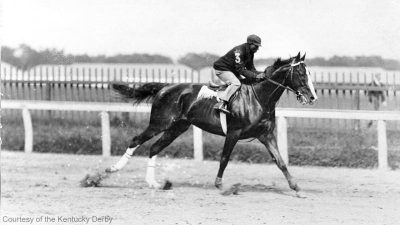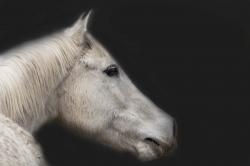With Russia’s invasion of Ukraine, usracing.com contributor and award-winning writer Maryjean Wall recalls the freedom journey of two-time Kentucky Derby winning jockey Jimmy Winkfield. Beginning in 1919, Winkfield fled Moscow for Odessa, then Poland, and then France. Born in Kentucky, Winkfield won the Derby in 1901 and 1902, and later moved to Moscow where he enjoyed fame and fortune before the Bolshevik Revolution sent him fleeing.
By Maryjean Wall
Residents of Odessa woke up last week to rocket explosions in their resort city in southwest Ukraine – evocative of jockey Jimmy Winkfield’s experience more than a century previously.
The bombing of Odessa is a reminder that horse racing is not removed from world events, and that history repeats itself. Winkfield escaped Moscow sometime after the Bolshevik Revolution began. He went southwest to Odessa where racing was still going on and he thought he would be safe from the Bolsheviks. He was so wrong.
Jimmy Winkfield – Photo courtesy of Nellie Davis, Black Maestro, published in the New York Times, May 29, 2006.
On the morning of April 4, 1919, Winkfield heard guns in the distance. The revolution was coming to Odessa. He quickly gathered up some 250 thoroughbreds and various horsemen friends who wanted to leave. Together they drove the horses on a 1,100-mile freedom run to Poland. They did not have an easy time on the trails.
Winkfield figured he was a target for the revolutionaries, and he was probably right. He was easy to spot, as a Black man, and well known in Russia after winning most of the country’s major races. The horses he rode were owned largely by the Czar’s inner circle of friends, which would have put a bulls-eye on his back.
Back home in the United States, Winkfield also was well-known. He had won the Kentucky Derby two years in succession in 1901 and 1902, the first jockey since Isaac Murphy to do so. But he saw no future in America for a rider of his skin color. Racial prejudice and violence were high. Winkfield’s number of mounts declined radically. An American horseman racing in Russia offered Winkfield an opportunity to ride there and Winkfield took him up on the offer.
Russian bettors and horse owners soon took to Winkfield, remarking favorably on his Blackness and his winning ways in the saddle. The jockey lived the good life in Russia, dining on caviar and making his home in a suite he purchased at Moscow’s most luxurious hotel. He earned some $100,000 a year, paid in rubles. He employed a white boy as his valet. He was enjoying the same excessive lifestyle of the nobility that inspired the peasants to revolt. Astutely, he realized that he, like the nobility, had to get out.
At first, he left Moscow for Odessa, on the shore of the Black Sea, thinking the revolutionaries would not go that far south. The track in Odessa actually was continuing to offer racing, despite the revolution. So, Winkfield moved south. Then came the April morning when he could hear gunfire off in the distance. This time he fled for his life.
Winkfield saddled one of the 250 thoroughbreds for himself. Winkfield was last heard saying as they departed Odessa, “This ain’t no longer a fit place for a small colored man from Chilesburg, Kentucky to be.”
He recollected that’s what he said, when reconstructing his epic journey to Sports Illustrated in a 1961 article titled, “Around the World in 80 Years.”
With Winkfield in the lead, the little band of horses and men turned northwestward from Odessa. The weather remained wintry, especially in mountains that the group had to cross to reach Poland. First, the group moved through Moldova. Then, the men turned the horses westward to cross northern Romania. They went through the tip of Hungary. Eventually they reached Poland. They were safe at last, but Warsaw and its racetrack still lay miles ahead, not on the border but in the central east part of that country.
The group’s flight through snow storms across rugged terrain had not gone well. The men and horses were exhausted. Not all the horses made it to Poland, for some were killed for food along the way in order for the men to survive.

Jimmy Winkfield 1902 Kentucky Derby Churchill- Photo courtesy of the Kentucky Derby
They reached Warsaw some three months after starting on their journey. Winkfield remained in Warsaw for awhile, riding races in the Polish city before moving to France in 1922. He was soon riding winners again, while becoming fluent in French, just as he’d acquired fluency in Russian. For a farm boy raised near Lexington, Winkfield revealed amazing abilities in linguistic pursuits as well as in race-riding.
Winkfield became hugely successful in France, first as a jockey, then later, as a trainer. But if he thought he’d gone on the lam for the last time, he was wrong.
After France declared war on Germany, Winkfield left and returned to the United States. America seemed no better for him than when he’d left the country. The nation was still segregated, still marked by racial prejudice and violence, and no one seemed to remember Winkfield. He could not get mounts as a jockey, since Black jockeys no longer were seen in the sport. He found work as an exercise rider at Aiken, South Carolina. It was the best he could do until eventually he was able to return to France. He died near Paris, France, in 1974 at age 91. The young Black man from Chilesburg had indeed had a very full life.

Maryjean Wall is the former turf writer for The Lexington Herald-Leader. She retired from that publication following a career that spanned four decades and included three Eclipse Awards and an AP Sports Editors Award. She holds a Ph.D. in U. S. History, has taught history at University of Kentucky, and continues to write about horse racing as a free-lancer. She has been published in Sports Illustrated, Wall Street Journal, Forbes Life, Cincinnati, and Keeneland, among other publications. She has authored two books focused on horses and racing: How Kentucky Became Southern: a Tale of Outlaws, Horse Thieves, Gamblers, and Breeders; also, Madam Belle: Sex, Money, and Influence in a Southern Brothel. When she is not writing, she is photographing, always pursuing the creative muse.
